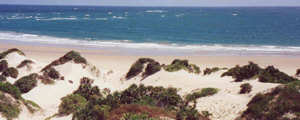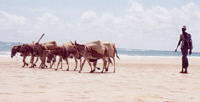At Home in Lamu
Lamu, Kenya
The Indian Ocean taught me new meanings of the word blue. The channel in front of the waterfront was dirty and had no beach, although that didn’t deter the local kids trying to escape the midday sun or the hungry donkeys looking for scraps of garbage. It was a hot forty-five minute walk to the quiet village of Shella. The beach there was spectacular and uncrowded, and it always looked different depending on the tide. Across the channel was Manda Island, but if you walked further down the beach, as I always did, the channel opened into the ocean, and there I would sit for hours watching the waves.
|
Beach boys sauntered between Lamu and Shella, renting windsurfing gear at the expensive Peponi Hotel and selling massages along the beach. “You want a massage today?” they would ask the girls, brandishing their little bottles of coconut oil. “My grandmother taught me good massage. They call me the medicine man, you know?” There was one who made his living selling sodas and samosas to thirsty sun-worshippers at inflated prices, and another who spoke Italian with a Milanese accent.
|
![]()
When the tide was low, it seemed possible to walk all the way to India, picking up hundreds of fragile “sand dollar” shells along the way. Some days the tide would rise within an hour, eating up the beach, and making it necessary to go over the sand dunes behind the beach and then take the forested back roads to return to Lamu. It was possible to take a dhow or a donkey, but I loved to walk, because every few minutes I would greet someone I knew. Kenyans take greetings very seriously, and in Swahili they’re endless. At least once a day, I would bump into one of the Super Stars, or the Indian guy who sold me rice, or the secondary school boys, or the varied and bizarre expats who called Lamu home. In line with Kenyan formality, every time I saw a familiar face, we’d do the obligatory handshake and go into the greetings:
“Mambo, Shirley!”
“Poa, poa. Habari ya asubuhi?”
“Mzuri sana. Umelalaje?”
“Fofofo! Habari kutoka juzi?”
“Salama tu. Habari ya kazi?”
“Siyo mbaya. Unaenda wapi?”
“Sasa naenda kufanya mazoezi. Na wewe?”
“Naenda Shella niogelee kidogo.”
“Haya. Tutaonana baadaye.”
“Mungu akipenda.”
The word habari – literally, news – could be combined with anything to form a variation of “How are you?”: how are you today, how’s it at home, how did you sleep, how did you wake up, how was your trip, do you have any problems, how are you since yesterday…
The first five minutes of any conversation consisted of greetings that got steadily more specific, after which if you were just passing, you could say goodbye. Swahili was just beginning to roll comfortably off my tongue and I reveled in any chance to practice it. I turned bargaining into an art form. With a flirtatious or conspiratorial “Ah, Bwana, punguza kidogo, tafadhali,” I would drive down the prices of everything from bananas to kangas.

